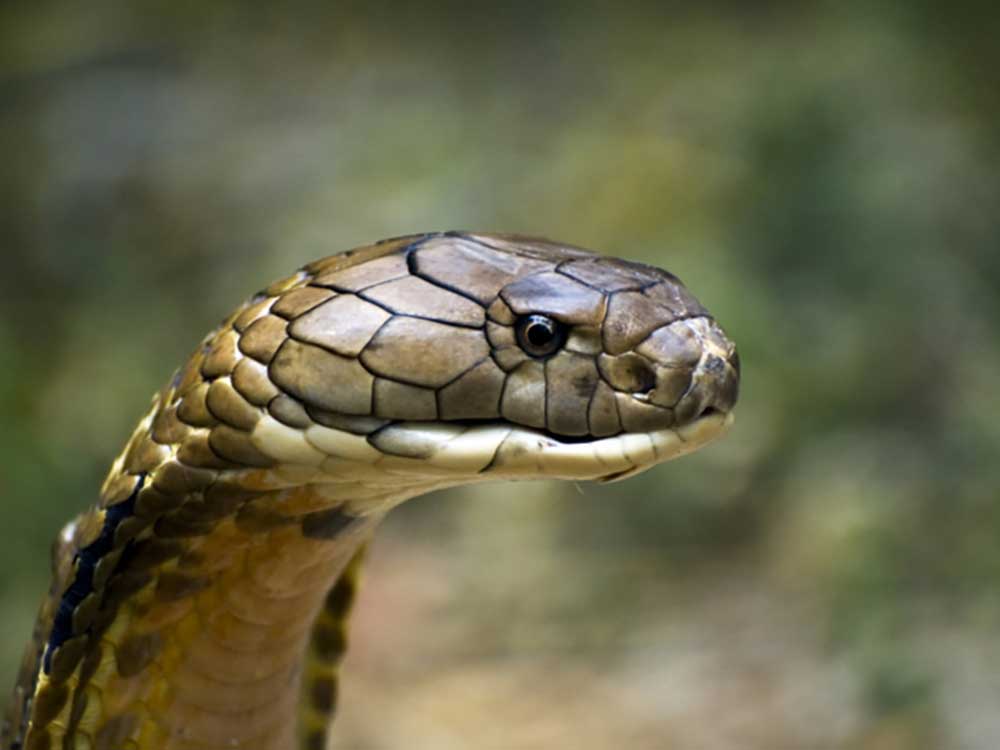The king cobra is not a member of the Naja genus, which all other cobras are, but rather has its own genus, Ophiophagus, Greek for “snake eating.”
They don’t call the king cobras kings for nothing and this massive venomous snake that eats pythons for lunch is native to much of Asia. A 13-foot king cobra was found in a palm oil plantation, and not wanting any harm to come to the plantation workers or the reptile, the Andhra Pradesh farmer contacted some snake handlers to take care of the king cobra.
మండలంలోని ఘాట్రోడ్డు సమీపంలో సైదారావు అనే రైతుకు చెందిన పామాయిల్ తోటలోకి ఆదివారం 13 అడుగుల భారీ కోడెత్రాచు (కింగ్కోబ్రా) ప్రవేశించింది.ఈ సమయంలో పామాయిల్ గెలలు కోస్తున్న కూలీలు దీనిని గమనించి వెంటనే తోట యజమానికి చెప్పారు. pic.twitter.com/9R8SP1XGJd
— DD News Andhra (అధికారిక ఖాతా) (@DDNewsAndhra) May 9, 2022
The snake catcher caught the cobra, placed it in a gunny sack and then released the reptile into the Vantlamamidi forest area, to the benefit of both human and snake.
“On Sunday, a 13-foot-tall Kodetrachu (king cobra) entered the of a farmer named Saidarao near Ghat Road in the zone,” the DD News Andhra news channel tweeted on Twitter. “He provided information over the phone to snake catcher Venkatesh, a member of the Eastern Ghats Wildlife Society. After a while, Venkatesh reached the plantation and…cunningly caught the king cobra. It was then put in a gunny bag and left in the Vantlamamidi forest area,” the news channel wrote.
The king cobra (Ophiophagus hannah) is probably the most popular venomous snake in the world due in part to its massive size and the fact that it raises its head with its hood spread when it becomes agitated. The snake is also respected for its capability to eat other large snakes, including smaller pythons in its range, such as reticulated and Burmese pythons.
King Cobra Information
King Cobra And Reticulated Python Battle Caught On Video
The king cobra is native to India and can be found throughout Southeast Asia, including Bangladesh, Bhutan, Burma, Cambodia, China, India, Indonesia, Laos, Nepal, the Philippine Islands, Singapore, Thailand, and Vietnam. It is not a member of the Naja genus, which all other cobras are, but rather has its own genus, Ophiophagus, Greek for “snake eating.”
While king cobras are feared in their native range, they are not responsible for the most deaths from a venomous snake. In fact, king cobras, like most other snakes, venomous and non-venomous, would prefer to stay away from humans, though human activity, such as deforestation and habitat destruction, has caused the interactions between venomous snakes and humans to grow. This palm oil plantation makes for a great candidate for king cobra human interaction. Other venomous snakes, such as the black mamba, are said by some to kill more people each year than the king of all venomous snakes.



